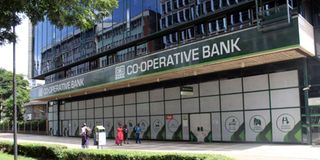
The Co-operative Bank building along Nairobi's Haile Selassie Avenue.
What you need to know:
Co-operative Bank of Kenya is projecting a sustained growth in interest income but a material fall in full year net profits for last year on higher provisions for loan defaults.
The lender, which has sustained profits above Sh10 billion since 2015, says ongoing Covid-19 scourge has continued to cause massive disruption on households and businesses and this will require increased loan loss provisioning to reflect this.
“We continue to actively engage our customers to support them through this difficult period, by re-aligning the servicing of loan facilities, their funding and transactional needs as the situation unfolds.
“Loan loss provisions have been much higher than in the previous year in appreciation of the challenges that businesses and households continue to grapple with in meeting their obligations to the bank,” said the lender yesterday.
Lending business
However, its mainstay lending business remains robust on account of sustained growth in asset base above Sh510 billion, Sh284 billion loan book, over Sh380 billion deposits and 8.8 million customer accounts.
Nine-month net interest income had for instance rose by 11.8 percent to Sh23.64 billion as the bank expanded lending by six percent.
Other lenders that have announced expected material fall in earnings include Standard Chartered, Absa, DTB, I&M Holdings and NCBA.
Co-op bank says its Covid-19 mitigation strategies including a proactive credit risk management project by a global consulting firm, McKinsey will give the business the impetus for sustained growth.
Coronavirus
The lender’s nine-month net profit had retreated by 10 percent to Sh9.77 billion, weighed down by near doubling of coronavirus-related loan loss provisioning. The bank had the lowest rise in loan loss provisioning (89.4 percent) among listed lenders by end of September.
That of Equity rose by nearly seven-fold as that of KCB increased by 242.5 percent.
The financier had by last September restructured loans valued at Sh46 billion or 16.2 percent of the loan book to accommodate customers seeking flexible options such as longer repayment period.
Covid-19 has exposed the hidden difference in the ability of banks to absorb shocks, majorly on account of different business models and the sectors from which they draw most of their clients.
Lenders whose market positioning is heavy-leaning on large private sector clients in sectors such as transport, hospitality, trade and horticulture had to raise provisioning to reflect the heavy disruption that befell these sectors.
Co-op’s outsized customer focus on consumer lending, especially government employees, government parastatals and quasi-government bodies, worked to its advantage.
palushula@ke.nationmedia.com





No comments :
Post a Comment